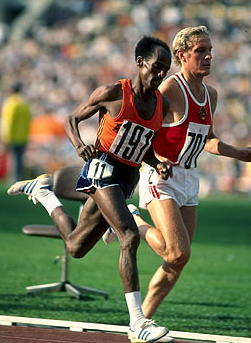 Captain Miruts Yifter was born in Tigray region of Northern Ethiopia in the district of Adigrat in 1938. Miruts spent early parts of his youth working in different factories and as a carriage driver. His talent as a long-distance runner was noticed when he performed exceptionally in the 1500, 5000 and 10000 meter events in Asmara of Northern Ethiopia. Once, it is said, Miruts saw athletes from the Air Force racing in the streets. Miruts begged Captain Gudina Kotu, leader of the team to let him run with these fine athletes. Captain Gudina finally agreed to let this young man run with the rest of the team where he went to unexpectedly win 3rd place.
Captain Miruts Yifter was born in Tigray region of Northern Ethiopia in the district of Adigrat in 1938. Miruts spent early parts of his youth working in different factories and as a carriage driver. His talent as a long-distance runner was noticed when he performed exceptionally in the 1500, 5000 and 10000 meter events in Asmara of Northern Ethiopia. Once, it is said, Miruts saw athletes from the Air Force racing in the streets. Miruts begged Captain Gudina Kotu, leader of the team to let him run with these fine athletes. Captain Gudina finally agreed to let this young man run with the rest of the team where he went to unexpectedly win 3rd place.
Miruts was so much encouraged by his results that he asked the Ethiopian athletics officials to let him practice with the national team that was making final preparations for the 1968 Olympics in Mexico City. Coach Negussie Roba was impressed by this young athlete and asked the Airforce officers stationed in Asmara to help him join the armed forces where he had a better chance of excelling. With the help of Majors Gudina Kotu and Mekuria Aberra, Miruts was eventually hired by the Ethiopian Air Force and transferred to the Air Force Headquarters in Debre Zeit, about 35 miles East of Addis Ababa.
Miruts competed with athletes from Africa, Asia, the Americas and Europe and excelled in 5000 and 10000 meters with outstanding results. His trademark secret and success was his ability to spring apart from the pack of runners at the last 200 meters or so. This unusual burst of energy that gave him victory after victory earned him the nick-name "Miruts the Shifter". In the 1972 Munich Olympics, Miruts took the bronze medal in the 10,000 metres but arrived too late for the 5,000 metres final. Miruts’ earned his country Ethiopia two gold medals at the Moscow Olympics in 1980 in the 5000 and 10000 meter races. Those two victories earned Miruts the wide respect and admiration of his country that was looking for the continuation of the country’s legacy set by the legendary Abebe and Mamo Wolde.
Miruts also had a very high chance of securing a gold medal in the 1976 Olympics held in Montreal, Canada had it not been for the boycott of the game by Ethiopia and other African countries protesting the participation of South Africa. In a long career, Miruts had participated in more than 252 races out of which he won 221 of them by earning the gold medal.
In recognition of his outstanding carrer, the World Sport Journalist Association honored Miruts by awarding him the "Golden Shoe".
Captain Miruts is married and is a father of seven. In the eyes of the grateful Ethiopian nation, Miruts has set an exemplary athletic record that has enabled the legacy of a great long-distance running tradition to continue.
